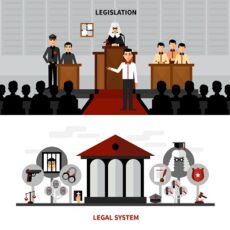
In the realm of Queensland’s legal landscape, the term “legislation” holds paramount significance. This blog seeks to unravel the intricacies of legislation in Qld, shedding light on its definition, the overarching scope of statute law, and the pivotal role courts play in shaping the legal framework.
Legislation, also commonly referred to as statute law, constitutes the body of laws enacted by the Queensland Parliament. It serves as the authoritative foundation for the governance and regulation of the state. Statute law, in essence, embodies the rules and regulations that citizens, businesses, and authorities must abide by within the jurisdiction of Queensland.
 At its core, statute law is an essential component of the legal system, providing a structured and codified framework that addresses various aspects of public and private life. Queensland’s statute law encompasses a diverse range of subjects, from criminal offenses to civil matters, labor regulations to environmental protection.
At its core, statute law is an essential component of the legal system, providing a structured and codified framework that addresses various aspects of public and private life. Queensland’s statute law encompasses a diverse range of subjects, from criminal offenses to civil matters, labor regulations to environmental protection.
Beyond the halls of Parliament, the courts in Queensland play a crucial role in shaping the legal landscape through the development and interpretation of common law. Common law, derived from judicial decisions, supplements statute law by providing precedent and nuance to legal principles. This dynamic interaction between legislation and common law forms the bedrock of Queensland’s legal system.
As we delve deeper into the nuances of legislation in Qld, subsequent sections will explore the distinctions between legislation and common law, the pivotal contributions of the Queensland Parliamentary Counsel, and practical insights into navigating this intricate legal terrain. Join us on this journey of understanding as we unravel the tapestry of legislation in the Sunshine State.
Navigating the legal terrain in Queensland involves understanding the nuanced interplay between legislation and common law. This section delves into the fundamental distinctions, offering insights into the definition, characteristics, and the profound significance these legal pillars hold within the Queensland legal system.
In the heart of Queensland’s legal system lies a dual framework comprising legislation and common law, each playing distinct roles in shaping the state’s jurisprudence.
Legislation, often referred to as statute law, emanates from formal written laws enacted by the Queensland Parliament. It provides a clear and predetermined set of rules and regulations, offering a comprehensive guide for citizens and legal professionals alike. In contrast, common law is born from judicial decisions, setting precedents that influence subsequent rulings.
Characteristically, legislation is codified, explicit, and can be amended through parliamentary processes. Common law, on the other hand, is more fluid, evolving through judicial interpretations of specific cases, and contributes to the development of legal principles over time.
The coexistence of legislation and common law is vital for the dynamism of Queensland’s legal landscape. While legislation provides a stable and predictable foundation, common law injects flexibility and adaptability. The judiciary, through common law decisions, ensures that legal principles respond to the evolving needs of society.
This interplay is essential in maintaining a balanced and evolving legal system. Legislation provides clarity and structure, while common law contributes depth and context. The synergy between the two pillars ensures a robust legal framework that can navigate the complexities of contemporary issues.
As we move forward, we’ll unravel the intricate layers of common law in Queensland, examining its historical roots and its continued influence on the state’s legal precedents. Join us as we explore the harmonious dance between legislation and common law in the Sunshine State.
Diving into the legal tapestry of Queensland, this section embarks on an exploration of common law – its roots, historical development, and the transformative journey it has undertaken to become an integral part of contemporary legal practice in the Sunshine State.
The origins of common law in Queensland trace back to the historical development of English law. As Australia was colonised by the British, the foundational principles of common law were transplanted onto this new and evolving legal landscape. The early courts in the colony relied on English common law decisions to establish precedents that would guide their own jurisprudence.
Over the years, common law in Queensland has evolved in response to the unique challenges and circumstances of the region. While the early days may have seen a reliance on English precedents, contemporary legal practice has witnessed the organic growth and adaptation of common law to suit the distinct needs of Queenslanders.
In the present legal landscape, common law decisions contribute significantly to the development of legal principles. Queensland’s courts, through their judgments, shape the state’s common law, setting precedents that influence subsequent cases. This evolution ensures that the legal system remains relevant and responsive to the dynamic societal and economic changes within Queensland.
As we delve deeper into the fabric of common law, subsequent sections will unveil its practical applications, examining landmark cases that have left an indelible mark on Queensland’s legal history. Join us on this journey through time as we uncover the rich and evolving legacy of common law in the Sunshine State.
Unveiling the architects behind Queensland’s legislative framework, this section shines a spotlight on the pivotal role and responsibilities shouldered by the Queensland Parliamentary Counsel. From the meticulous drafting of statute law to the intricacies of publication processes, the Queensland Parliamentary Counsel plays a central role in shaping the legal landscape.
 At the heart of Queensland’s legislative process stands the Queensland Parliamentary Counsel, an entity charged with the crucial task of crafting statute law. This involves translating policy decisions made by the Queensland Parliament into clear, precise legal language. The drafting process requires an acute understanding of legal nuances, ensuring that the resulting laws are both comprehensive and unambiguous.
At the heart of Queensland’s legislative process stands the Queensland Parliamentary Counsel, an entity charged with the crucial task of crafting statute law. This involves translating policy decisions made by the Queensland Parliament into clear, precise legal language. The drafting process requires an acute understanding of legal nuances, ensuring that the resulting laws are both comprehensive and unambiguous.
Once the statute law is meticulously drafted, the Queensland Parliamentary Counsel oversees its publication, ensuring accessibility to all stakeholders. The publication process involves making the laws available to the public, legal practitioners, and relevant authorities. This transparency is fundamental in fostering a legal system where citizens and professionals alike can readily access and comprehend the laws that govern them.
The Queensland Parliamentary Counsel, through their expertise in legal drafting and commitment to transparent processes, plays a critical role in maintaining the integrity and functionality of Queensland’s legislative framework. In the subsequent sections, we will delve into the broader implications of statute law in Queensland, exploring its impact on citizens, businesses, and the overall legal landscape. Join us as we unravel the layers of legislative craftsmanship that shape the laws we abide by in the Sunshine State.
Embarking on a journey through Queensland’s legal terrain, this section provides a panoramic overview of the statute law that forms the backbone of the state’s legal system. From the key areas covered to the profound impact on citizens and businesses, understanding Queensland’s legal landscape is essential for navigating the intricacies of the Sunshine State’s legal framework.
Queensland’s statute law spans a diverse array of subjects, addressing the multifaceted aspects of society and governance. From criminal law to family law, environmental regulations to labor statutes, the statute law encapsulates a comprehensive framework that guides the conduct of individuals, businesses, and government entities. This breadth ensures that Queensland’s legal system is equipped to address the ever-evolving needs of its populace.
The influence of Queensland’s statute law extends far beyond the legislative chambers. For citizens, it provides a structured framework that defines their rights, obligations, and responsibilities. Whether navigating family matters or engaging in business transactions, individuals rely on statute law as a reference point for legal conduct.
Businesses, too, operate within the parameters set by Queensland’s statute law. Regulations governing commerce, employment, and environmental practices are enshrined in statute, shaping the business landscape and fostering a framework for fair and ethical practices. Understanding and complying with these laws are imperative for businesses to thrive and contribute positively to the state’s economic ecosystem.
As we delve deeper into the implications of statute law, subsequent sections will unravel the practical applications of these legal frameworks in real-life scenarios. Join us as we navigate the legal contours of Queensland, exploring how statute law permeates and influences the daily lives of its residents and the operations of its businesses.
Delving into the practical application of Queensland’s legislation, this section explores pivotal moments in the legal landscape through a lens of landmark cases. From illustrative examples that highlight the intricacies of statute law to the lasting precedents set within Queensland, these case studies provide a tangible understanding of legislation in action.
Examining landmark cases offers a vivid portrayal of how Queensland’s legislation shapes legal outcomes. Cases involving criminal law, civil disputes, and regulatory matters serve as real-world examples of the application and interpretation of statute law in diverse scenarios.
Landmark cases in Queensland not only resolve immediate disputes but often set precedents that influence future legal decisions. These precedents become integral to the evolving common law, establishing principles that guide subsequent cases and contribute to the ongoing development of Queensland’s legal framework.
As we dissect these case studies, a clearer picture emerges of how legislation in Qld isn’t just a static set of rules; it’s a dynamic force, adapting to the complexities of real-life situations and leaving a lasting imprint on the state’s legal history. Join us in this exploration of legislation in action, where the courtroom becomes a stage for the unfolding drama of justice and legal interpretation.
For both citizens and legal professionals alike, navigating Queensland’s intricate statute law is essential. This section serves as a practical guide, offering insights into accessing legislation resources and deciphering the sometimes perplexing legal jargon that can be a barrier to understanding the laws that govern our lives.
Navigating Queensland’s statute law begins with easy access to the relevant resources. The Queensland Legislation website, maintained by the Queensland Parliamentary Counsel, serves as a comprehensive repository. Citizens and legal professionals can utilise this platform to access the full text of current legislation, amendments, and historical versions. The website’s user-friendly interface facilitates efficient navigation, empowering users to stay informed about the laws that impact them.
The language of the law can often be intricate and laden with jargon. For citizens, understanding legal documents may seem like a daunting task. However, resources such as explanatory memoranda, available alongside legislation, can provide valuable insights. Seeking legal advice or consulting community legal services can further enhance comprehension. For legal professionals, continuous legal education programs and engaging with legal communities can aid in staying abreast of evolving legal language and interpretations.
 Empowering citizens and legal professionals with the tools to navigate statute law is crucial for fostering a transparent and accessible legal system. Queensland’s commitment to providing accessible online resources ensures that understanding the law is within reach for all who seek it. In the upcoming sections, we will delve into the broader implications of Queensland’s legal framework and explore how it shapes the state’s dynamic societal landscape. Join us as we embark on a journey through the practical aspects of navigating Queensland’s statute law.
Empowering citizens and legal professionals with the tools to navigate statute law is crucial for fostering a transparent and accessible legal system. Queensland’s commitment to providing accessible online resources ensures that understanding the law is within reach for all who seek it. In the upcoming sections, we will delve into the broader implications of Queensland’s legal framework and explore how it shapes the state’s dynamic societal landscape. Join us as we embark on a journey through the practical aspects of navigating Queensland’s statute law.
Anticipating the trajectory of Queensland’s legal landscape requires a forward-looking lens. In this section, we explore emerging legislative changes, anticipated reforms, and the profound implications these developments hold for the future of the Queensland legal system.
Queensland, like any dynamic legal system, is poised for legislative evolution. Anticipated reforms span a spectrum of legal domains, from environmental regulations to criminal justice procedures. As societal needs and priorities shift, lawmakers are expected to respond with forward-thinking reforms aimed at enhancing justice, equity, and efficiency.
The implications of these anticipated reforms extend beyond the text of the law. They have the potential to redefine legal processes, reshape precedents, and influence the interactions between citizens, businesses, and the government. As Queensland embraces progressive legislative changes, the legal system is primed to adapt, ensuring it remains a resilient and relevant force in the face of societal shifts.
As we gase into the future, the evolving nature of Queensland’s legal framework promises to be dynamic and responsive. In the upcoming sections, we will delve into the practical consequences of these changes, exploring how they may impact the lives of citizens, the operations of businesses, and the overall fabric of the Queensland legal system. Join us on this journey into the legal frontier of tomorrow.
In this journey, we’ve deciphered the dual pillars of legislation and common law, explored the critical role of the Queensland Parliamentary Counsel, traversed the diverse realms of statute law, and witnessed its impact through landmark cases. Navigating this legal terrain necessitates a keen understanding of both the codified statutes and the dynamic precedents set by the courts.
Understanding legislation in Qld is not merely an academic pursuit; it is a practical necessity. For citizens, it means knowing their rights and obligations, and for businesses, it’s about operating within the legal framework. Legal professionals, too, must grasp the nuances to navigate the intricacies of the system. A transparent legal landscape fosters a just society, and an informed populace is the bedrock of a thriving democracy.
As we bid farewell to this exploration, we leave you with the conviction that an informed understanding of legislation is the key to active participation in Queensland’s legal narrative. Join us in future discussions as we continue to unravel the complexities that shape the legal fabric of the Sunshine State.
Learn about statute law and its role in shaping the legal framework in Queensland.
Understand the distinctions and interactions between legislation and common law in Queensland.
Discover the role of the Queensland Parliamentary Counsel in drafting and publishing statute law.
Explore the official Queensland Legislation website for easy access to current and historical laws.
Gain insights into the implications of statute law on businesses operating in Queensland.
Get practical tips on accessing and understanding legislation resources for citizens.
Stay informed about emerging trends and reforms that may shape the future of Queensland’s legal system.